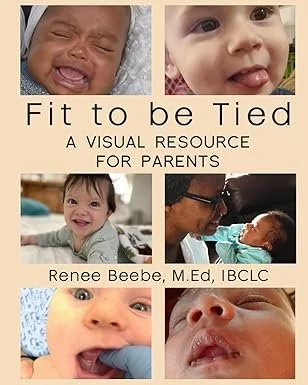Tongue Ties Uncovered: What Every Parent Needs to Know (Guest: Renee Beebe, IBCLC)
Listen to the Podcast:
Bringing a baby into the world is magical, but let’s be real—feeding that tiny human isn’t always the seamless, Instagram-perfect experience we expect. Whether you plan to breastfeed, bottle-feed, or do a combination, understanding common feeding challenges before your baby arrives can make a world of difference.
One of the biggest hurdles new parents face? Tongue ties and lip ties. These seemingly small oral restrictions can lead to painful nursing, bottle-feeding difficulties, weight gain issues, and even excessive gas and reflux. The worst part? Many parents don’t realize what’s happening until weeks (or even months) of exhaustion and frustration have set in.
Renee Beebe, an experienced IBCLC and author of Fit to Be Tied: A Visual Resource for Parents, has seen this time and time again. That’s exactly why she wrote this book—to give parents an easy-to-understand guide with visual examples of what tongue and lip ties look like, how they affect feeding, and what options exist for treatment.
So, let’s talk about how you can set yourself up for success. By learning the signs of tongue ties before birth, lining up the right support team, and understanding what not to do, you’ll walk into postpartum feeling informed, empowered, and ready to handle whatever feeding challenges come your way.
What Is a Tongue Tie (and Why Should You Care)?
A tongue tie (also called ankyloglossia) occurs when the thin piece of tissue under a baby’s tongue (the frenulum) is too tight or restrictive, limiting tongue movement. A lip tie is similar but involves the tissue connecting the upper lip to the gums.
While tongue ties have always existed, awareness has skyrocketed in recent years—along with confusion and misinformation. Some providers brush them off as a “breastfeeding issue,” while others immediately recommend a procedure. The truth? A tongue tie isn’t just about appearance—it’s about function.
In Fit to Be Tied, Renee explains that a baby with a restricted tongue may struggle to:
• Latch deeply at the breast, causing nipple pain and damage
• Transfer milk efficiently, leading to poor weight gain or constant feeding
• Maintain suction, resulting in clicking noises and excess air intake (hello, reflux and gas!)
• Coordinate tongue movement for bottle feeding (yes, tongue ties can affect bottles too!)
And here’s the kicker: if a baby can’t use their tongue properly for feeding, it can also impact future speech, dental development, and even airway health.
How to Set Yourself Up for Feeding Success Before Baby Arrives
The best time to prepare for potential feeding challenges? Before birth. Too often, parents don’t realize there’s an issue until they’re deep in sleep deprivation, pain, and frustration. Here’s how to stack the odds in your favor.
1. Book a Prenatal Lactation Consultation
Even if you don’t plan to breastfeed, a prenatal consult with an International Board-Certified Lactation Consultant (IBCLC) can be a game-changer. An experienced IBCLC can:
• Teach you what a proper latch should feel like
• Help you recognize early feeding red flags
• Guide you in choosing the best bottles for optimal oral function
• Discuss hand expression and milk supply protection in case of feeding struggles
A little knowledge ahead of time can save you so much stress later.
2. Know the Signs of a Tongue Tie
While you don’t need to diagnose your own baby, knowing what to watch for can help you advocate for timely support. In her book, Renee shares real-life examples and photos of tongue ties, helping parents spot key red flags like:
• Painful nursing (it shouldn’t hurt, no matter what anyone says)
• Nipple damage or lipstick-shaped nipples after feeds
• Clicking sounds, gassiness, or frequent unlatching
• Baby falling asleep at the breast but waking up hungry soon after
• Excessive reflux, spit-up, or colic-like symptoms
Bottle-fed babies can also struggle! If feeding takes forever, baby seems frustrated, or milk dribbles out the sides of their mouth, a tongue tie could be in play.
3. Choose Your Postpartum Support Team Now
Not all pediatricians or providers recognize tongue ties as a legitimate feeding concern. That’s why it’s crucial to line up a team that does before you give birth.
At a minimum, consider having:
✅ A trusted IBCLC (not just a hospital lactation consultant)
✅ A feeding specialist (if bottle-feeding)
✅ A bodyworker trained in infant oral function (chiropractor, craniosacral therapist, or pediatric physical therapist)
If a release procedure (frenotomy) is necessary, having this support in place beforehand ensures a smooth recovery and better feeding outcomes.
4. Be Cautious About the “Wait and See” Approach
Many well-meaning providers say things like, “Just wait, it will stretch over time,” or “If baby is gaining weight, everything’s fine.”
But here’s the truth:
🚩 Ties don’t magically go away. They can loosen slightly as baby grows, but function won’t improve without intervention.
🚩 Weight gain doesn’t equal effective feeding. Some babies compensate in ways that exhaust them (or you).
🚩 A tongue tie affects more than just breastfeeding. Long-term issues can include speech difficulties, dental crowding, and airway development problems.
If feeding feels off, trust your gut.
What If Your Baby Needs a Tongue Tie Release?
If a release procedure is needed, Fit to Be Tied offers a step-by-step guide on:
🔹 How to choose the right provider (because not all are created equal)
🔹 Why bodywork before and after the procedure is critical for success
🔹 What to expect during the healing process (hint: it doesn’t have to be traumatic!)
Final Thoughts: Empower Yourself Before Baby Arrives
Postpartum is not the time to be scrambling for answers. By preparing ahead, lining up support, and knowing what to look for, you can step into your fourth trimester feeling empowered instead of overwhelmed.
Here’s your action plan:
✔️ Book a prenatal lactation consult (even if you’re bottle-feeding!)
✔️ Learn the signs of feeding struggles so you can catch them early
✔️ Build your support team before baby arrives—an IBCLC and bodyworker are gold
✔️ Trust your instincts—if feeding feels off, seek help sooner rather than later
Feeding your baby shouldn’t be painful, exhausting, or confusing. And if it is? You deserve support that actually helps.
Looking for more expert advice? Tune into my latest podcast episode, where I chat with IBCLC Renee Beebe about everything parents need to know about tongue ties, feeding struggles, and how to get the right help. And be sure to check out her book, Fit to Be Tied, for a visual guide to all things tongue tie-related.
Guest: Renee Beebe, IBCLC
Renee Beebe has been working in the field of lactation since the birth of her first child in 1990—as a La Leche League Leader, postpartum doula,, and IBCLC. Every time she works with a breastfeeding dyad, she draws from her background in education and child development. Since becoming an IBCLC in 1997, Renee has supported families through home, hospital, and clinic visits in the Seattle area and telehealth consultations internationally. She has spoken for a variety of local and international organizations about breastfeeding and tongue tie.
Renee has developed a special interest in tongue ties and helped develop a tongue-tie clinic. She has assisted with over 2,000 frenotomies with scissor and laser release providers. She understands how confusing the issue of tongue ties can be for families, which led her to write her book "Fit To Be Tied: A Visual Resource for Parents."
Website: https://www.second9months.com
Instagram: @second9months
Email: second9months@gmail.com
Buy your copy today!
Fit To Be Tied: A Visual Resource for Parents by Renee Beebe, IBCLC: https://amzn.to/4gTqDkI



